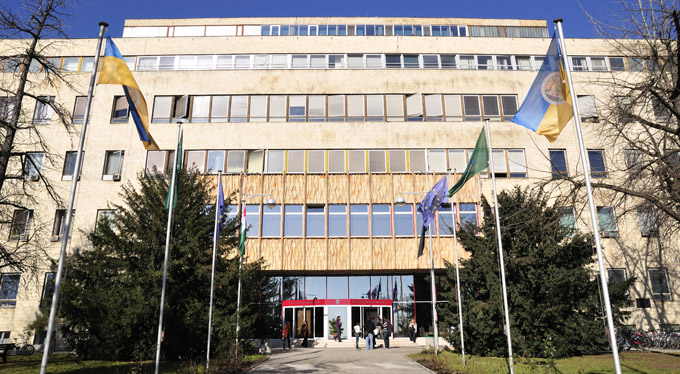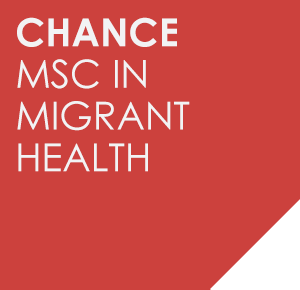Msc in Migration Health 2.16.2016.
The course is offering systematic education and training in public health and health care services, focussing on the new challenges arising from an increasing ethnic, cultural and language diversity of migrants. This master course is complementing and building on the competencies of health care service providers, practitioners as well as health administrators. The master course is responding to the changing demands on health systems which result from increasing dynamics of migration to Europe and within: diversity in societies leads to changing patterns of diseases and different health behaviour of patients. The coping strategies take the changing demands in an increasingly complex social setting into account.
Curriculum
The Master programme responds to the need for special training of health professionals by providing the knowledge, skills and competencies around 6 core subjects:
Module 1
Research methodology and epidemiology
- Qualitative and quantitative research methods
- Epidemiology
- Determinants of health and diseases
Module 2
Environmental medicine and occupational health
- Migration-specific aspects of occupational health
- Work-related aspects of health
Module 3
Economics and Migration Health
- Micro and macro economics and migration
Module 4
Migrant sensitive health care
- Organisational and management requirements
- Legal framework, policies, diversity management, evaluation
Module 5
Clinical and public health assessment
- Clinical aspects of migrant health
- Health promotion
- Health education
Module 6
Behavioural and psycho-social aspects of migration
- Theoretical foundation
- Intercultural communication
- Intercultural competence
The curriculum has been developed in the context of the ERASMUS-project 511371-LLP-1-2010-1-HU-ERASMUS-ECDSP by University of Pécs, Danube University Krems, Pavol Jozef Šafárik University in Košice, Medical University of Graz, Ernst-Moritz-Arndt-University Greifswald and University of East Anglia.
Learning concept
Each module (15 ECTS) consists of 5 contact phases of 4 days each (Thursday to Sunday). In some modules, where practical training is dominant, 2 contact phases may be condensed into one block of 8 days.
Module 1 ‘Research Methodology and Epidemiology’ will be spread over 4 semesters. The last semester will be reserved for the master’s thesis and practical training.
Module 2 ’Environmental Medicine and Occupational Health’ and module 5 ‘Clinical and Public Health Assessment’ will be offered by the University of Pécs, Hungary. All other modules will be offered at Danube University Krems, Austria.
Program objectives
- Applying organizational and management principles to challenges arising from the diversity in the health care and health promotion sector
- Understanding the role of the global economy and legal and institutional framework for migration flows and addressing the implications for public health care systems
- Establishing a firm theoretical foundation in research methodology and epidemiology and the competence to apply it in original research
- Gaining knowledge in morbidity profiles and lifestyle-related as well as work-related diseases in migrant populations and application to everyday tasks
- Enhancing capacities in multi-disciplinary professional work
- Understanding multicultural and multireligious aspects of physical and mental health and developing adequate responses
- Building up intercultural competence and communication skills
- Deepening work experience through practical training
Admission requirements
- An Austrian or equivalent foreign Bachelor's degree in health sciences, humanities, social sciences or economic or business studies or a similar field and
- proficiency in spoken and written English and
- positive assessment of the admission procedure (i.e. interview).
Target group
- Students with a Bachelor's degree in health sciences, humanities, social sciences as well as economics and business studies, who want to work in the public health sector with a focus on migrant health
- Health professionals in mid-career positions who want to complement their knowledge and competencies by focussing on migrant health needs
- Public health administrators, government officials, persons managing migration flows, in particular refugee flows
CHANCE: MSc curriculum in Migrant Health: Addressing New Challenges 3.30.2014.

István Szilárd coordinator of the ERASMUS Lifelong Learning Program co-financed CHANCE project
University of Pécs Medical School
The influx of migrants towards the European Union is continuously growing. It causes a challenging impact on all the health/public health, social and economic sectors of Europe. The CHANCE program is aiming to address this complex issue from the health angle, focusing on the alarming need in human resource capacity. In spite of this, at present there is a significant shortage of formal higher education programs in Europe aiming to train professionals with the necessary knowledge and skills enabling them to address this new challenge.
The main objective of the CHANCE program is in synergy with the WHO Public Health Aspects of Migration in Europe (PHAME) project that aims to strengthen countries’ capacities to manage large and sudden influxes of migrants. The CHANCE consortium of six EU academic institutions is coordinated by the University of Pécs with the co-financing of the EU ERASMUS Lifelong Learning Program in order to address this need for human resources.
The curriculum provides motivation and orientation, knowledge and skills for postgraduate students, health, public health and social care professionals who (intend to) assist, treat, care for and refer migrating persons and/ or design, plan and implement health and social care programs for migrating populations and their integration and/or for those who aim to participate in migrants’ health related researches. The academic content is built around six core competencies (C):
- C1: epidemiology and research methodology (University of East Anglia, UK).
- C2: environmental medicine and occupational health (University of Pécs, Hungary).
- C3: economic/health economic impact of migration (University of Pécs, Hungary).
- C4: organization and systems management (University of Krems, Austria).
- C5: clinical and public health assessment (University of Kosice, Slovakia).
- C6: social and behavioral aspects of migration including multicultural and multireligious aspects and their health/mental health impact (University of Greifswald, Germany).
The curriculum will be launched in the coming academic year. The University of Pécs’s Migrant Health Programs and the CHANCE website provide more detailed information about the program . Interested persons can already register in order to receive updated information.
The University of Pécs is proud to contribute with its experience and scientific capacity to the WHO PHAME program. Our training and research profile is in synergy with its objectives and the Newsletter is a challenging opportunity to assist in the strengthening of the response capability via advocacy, information sharing and training provision.


